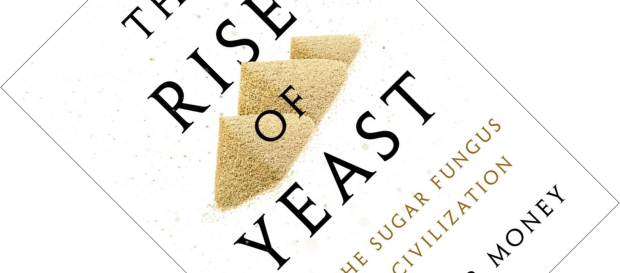From the Giza-pyramid-complex-shaped mountains of dried yeast, to the visual joke on the spine (I see what you did there), The Rise of Yeast is an amusing read about fungus. In case you find that hard to believe, Nicholas P. Money, mycologist and professor of Botany, has been waxing lyrically about micro-organisms for years. Here, he highlights the humble yeast and how it has shaped human history. For without yeast there would be neither bread nor booze.

“The Rise of Yeast: How the Sugar Fungus Shaped Civilisation”, written by Nicholas P. Money, published by Oxford University Press in February 2018 (hardback, 210 pages)
After a short introduction to the basics of yeast biology – including how it metabolises sugar and creates alcohol – and how yeast was discovered, Money first takes a look at fermentation in the wild and a host of nature’s tipplers. Fruit bats, treeshrews and elephants all encounter alcohol, but not all get drunk despite anecdotes to the contrary. Rather, it signals the nearby presence of sugary nectar on which yeast thrives. Our primate ancestors evolved the ability to quickly metabolise alcohol and Robert Dudley went so far as to suggest that the behaviour that evolved to find ripe and overripe fruit explains our attraction to alcohol (see The Drunken Monkey: Why We Drink and Abuse Alcohol). But it was not until we learned to brew with yeast that we managed to push up alcohol levels sufficiently to inebriate ourselves. Money takes us through the archaeological evidence for the brewing of wine and beer, noting how some have even gone so far as to suggest that the prime reason for humans settling down was to provide brewers with the raw materials they needed.
The other well-known role for yeast is of course in baking bread, for which evidence can be traced back to the ancient Egyptians. Money takes the reader on an amusing historical tour of the use of yeast in manufacturing bread and other food products. But yeast has also played an important role in basic scientific research. Its genome has been completely sequenced, and the many functions of its genes have been elucidated. Researchers are currently working on a completely synthetic version of yeast, rewriting its DNA from scratch and leaving out millions of years of evolutionary baggage, while maintaining its functionality. This synthetic organism could be completely re-engineered to meet our needs.
“[…] nature’s tipplers – fruit bats, treeshrews and elephants – all encounter alcohol, but not all get drunk […]”
This leads into the most technical chapter in the book on the use of yeast in biotechnology. Yeast has been a workhorse in the production of biofuels, insulin for diabetes patients, and various vaccines. The Gates Foundation is funding ongoing research into modifying yeast to produce artemisinin, an anti-malarial drug. Finally, Money gives an overview of the evolutionary diversity of wild yeasts and some of the bizarre adaptations they have to spread themselves, as well as their role in health and disease. It is really only people with severely weakened immune systems, think HIV infections or cancer, who are at risk of infection by the sugar fungus. And pseudo-scientific claims from various health gurus notwithstanding, Candida yeasts are a benign part of our microbiome. Instead, Money highlights yeasts that are actual health risks.
The Rise of Yeast is a neat little book that elegantly covers a lot of ground. Money is no stranger to writing pop-science books about fungi and microbes. Some of the more outlandishly titled books he has previously written are The Amoeba in the Room: Lives of the Microbes, The Triumph of the Fungi: A Rotten History, Carpet Monsters and Killer Spores: A Natural History of Toxic Mold, and Mr. Bloomfield’s Orchard: The Mysterious World of Mushrooms, Molds & Mycologists. He shows himself a gifted writer who keeps the matter light and infuses it with a touch of humour. Though not an all-encompassing deep history of baking or brewing, this book nevertheless gives many reasons why you should care more about little single-celled fungi.
Disclosure: The publisher provided a review copy of this book. The opinion expressed here is my own, however.

, ebook, audiobook or audio CD
Other recommended books mentioned in this review:
__________________________________________________________________






6 comments